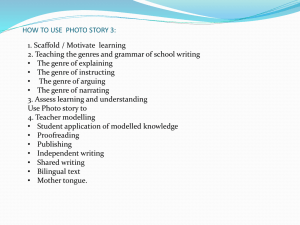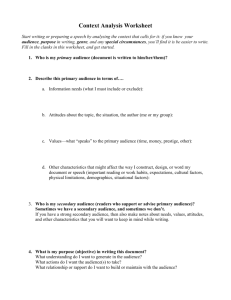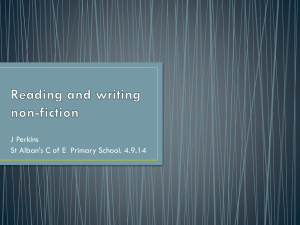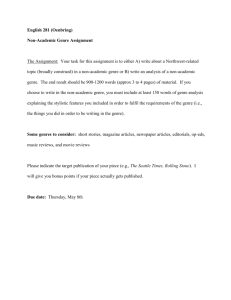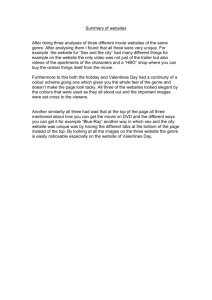Genre Criticism
advertisement
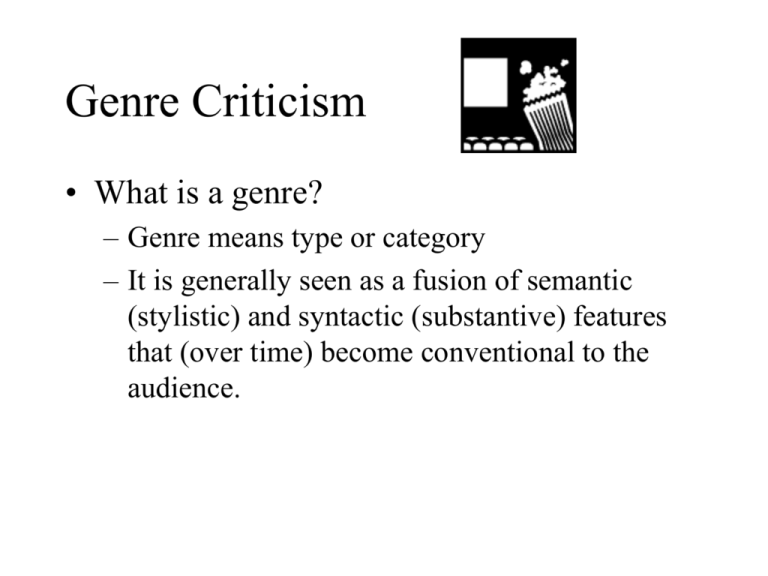
Genre Criticism • What is a genre? – Genre means type or category – It is generally seen as a fusion of semantic (stylistic) and syntactic (substantive) features that (over time) become conventional to the audience. Genre Criticism • Television Genre – A type or category of program which shares a set of characteristics with other TV programs in that category • Law and Order is one type of crime drama • Without A Trace is one type of crime drama Are they the same or different genre? Genre Criticism • Characteristics of genres – Genres can be both state and dynamic – Members of the genre share conventions (similar features) with other members of the genre, but may have unique features that separate them Genre Criticism • Why do genres survive? – Audience needs: escapism from everyday routines and the boredom associated with dayto-day living – Popular genre texts resolve tensions by being both predictable and innovative (e.g 24) – Media institutions needs: economic need to draw large audiences weekly to keep advertisers happy Genre Criticism • Foundation of Genre Theory – Rhetorical roots can be traced to Aristotle (330 BC) - Genres became solidified into rules for style and form (e.g. poetry, drama, song) – 18th Century - revolt against such constraints created new forms (e.g. novel) – Electronic media borrowed from traditional forms and created new ones (e.g. radio soap opera) Genre Criticism • Foundation of Genre Theory – Chicago school of criticism - renewed interest in how genres shape individual artist’s work and vice-versa. Genre Criticism • Film and Radio Roots of Genre TV – Film - success of particular films led to making more of the same, discovery that audiences liked genre films – ‘Classic’ Hollywood era production studios made many genre films that European filmmakers and critics dubbed Hollywood a ‘factory.’ Genre Criticism • Film and Radio Roots of Genre TV – Radio networks learned the value of genres in raising audience expectations – The need for weekly programming radio turned to two forms • Serial narratives (installment stories -borrowed from magazines - soap operas) • Series narratives (independent episodic adventures of a regular cast of characters (crime drama Dragnet) Genre Criticism • Film and Radio Roots of Genre TV – Game shows - contestants would compete for prizes and fame – Situation Comedies - regular characters thrust into humorous situations weekly – Vaudeville - entertainment/ variety shows Genre Criticism • TV Networks Adapt the new medium – Since TV nets were the Radio nets, they initially developed TV shows that mirrored radio shows • • • • Situation comedies Crime Dramas Variety and Game shows Soap operas Genre Criticism • Three Approaches to Genre Analysis – Aesthetic approaches • Focus on formal, stylistic features and innovations • Typically looks at narrative structures and ignores other syntactic features • Usually provides limited insight into the genre’s rhetorical force Genre Criticism • Three Approaches to Genre Analysis – Ritual approaches • Focus on underlying mythic, culture-typal themes • Often use semiotic/structural analysis • Use enduring or changing features of popular generic texts to explore cultural tensions, rules, roles and efficacy of social myths Genre Criticism • Three Approaches to Genre Analysis – Ideological approaches • Focus on how ideas, roles, norms that ‘naturalize’ current inequitable distribution of economic, social, political power and resources are expressed in text • Use semiotic/structural and ideological critical terms and concepts • Provide insight into how genre texts question or celebrate the social, political, economic or cultural status quo of society Genre Criticism • Reasons to do Genre Analysis – To compare and contrast two genres – To evaluate the quality of a particular member of genre – To trace the history of a genre – To examine the relationship between the genre and society’s dominant cultural ideologies Genre Criticism • Writing Genre Criticism – The Chicken- Egg, Empiricist- Idealist dilemma - the problem of how to know where to start Genre Criticism • Writing Genre Criticism – Deductive approach • Assumes the genre already exists • Used to answer questions about what genre a program belongs to, similarities and differences between genre texts, between styles, traces changes over time Genre Criticism • Writing Genre Criticism – Inductive approach • It proposes that a group of texts with some similarities might constitute a new genre • It is used to answer such questions as ‘What is this new program? Or ‘What features do this group of programs share?’ Genre Criticism • Overarching statement – Regardless of vocabulary, a genre is a group of texts unified by a foundation of shared features that overtime have become accepted to form specific conventions within that type Genre Criticism • Different aspects of genre features that critics identify and analyze – Semantic (formal/ stylistic) • • • • • • Character type Location (geography, time, space) Scene setting ( indoors/outdoors) Characteristics of types of shots, camera work Style of action Editing Genre Criticism • Different aspects of genre features that critics identify and analyze – Syntax (substantive) • • • • Narrative structure Dialetic (recurring structure of paired opposition) Recurring themes Discourses (themes that are ideological or other)

